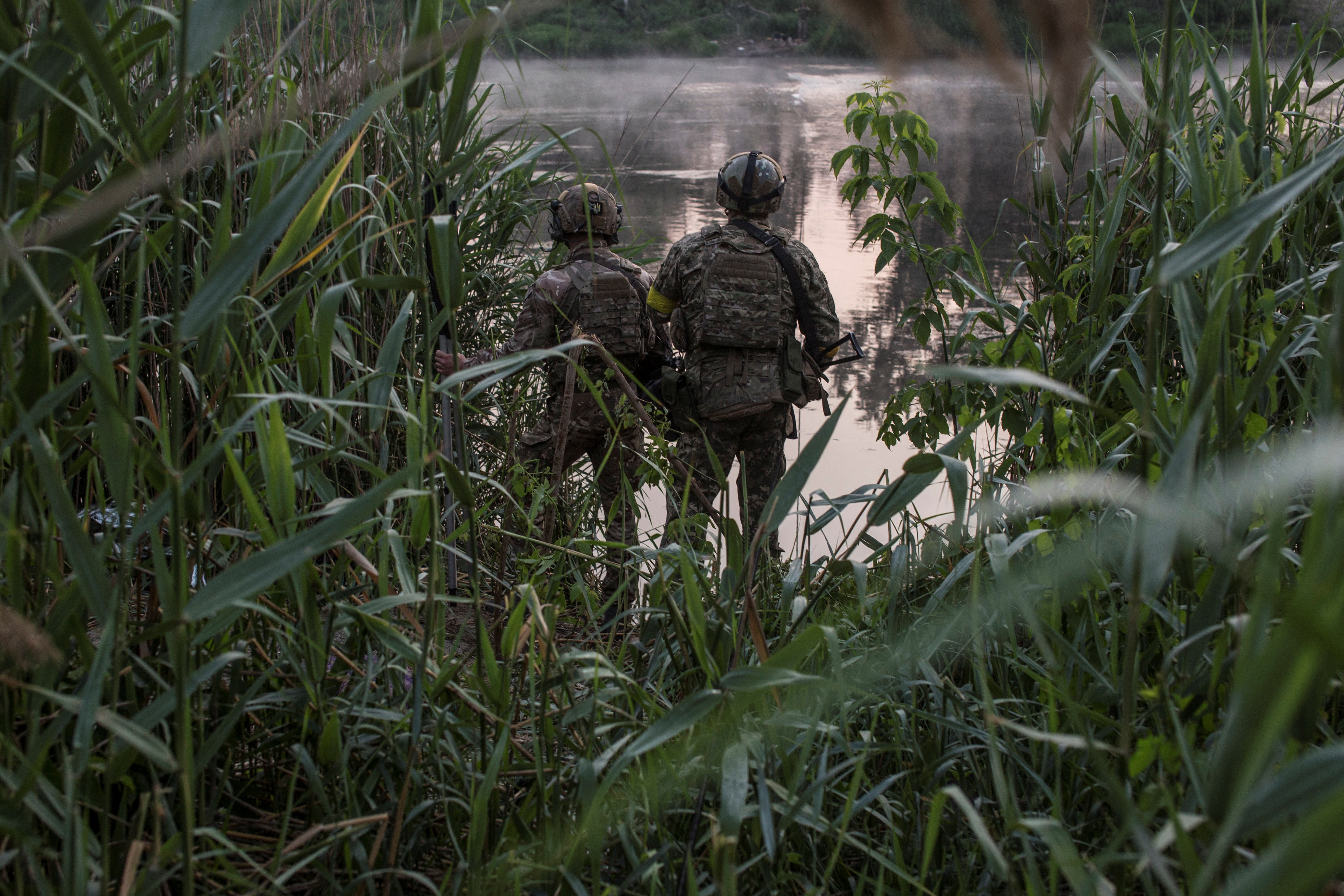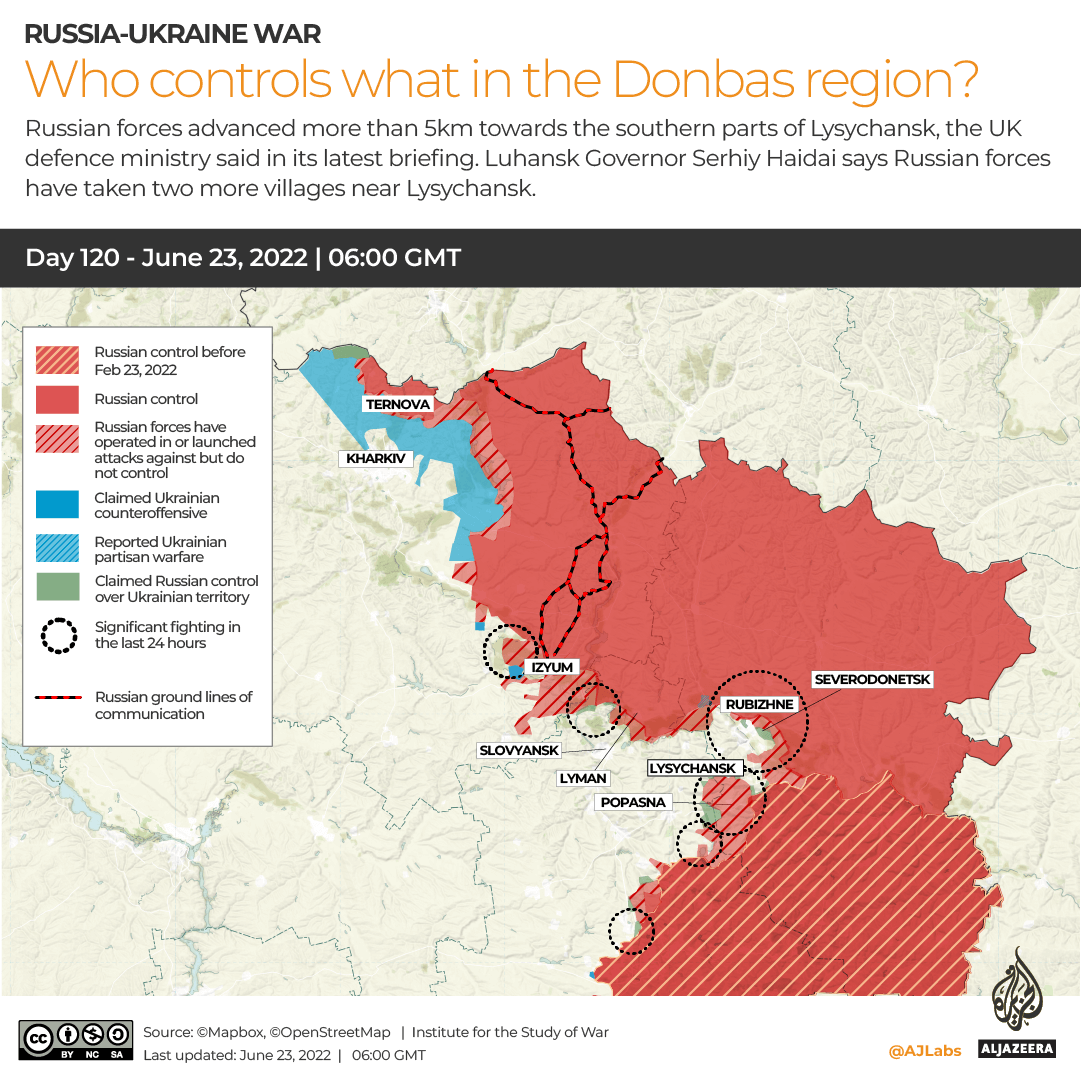
Here, Al Jazeera looks at the major events that marked the 17th week of the war in Ukraine:
June 15
Russian forces attack Ukraine’s easternmost free city of Severdonetsk from several directions, as Ukrainian defenders fight to take back the city centre.
Russian mercenaries from the Wagner Group reportedly threaten to cut off the Severdonetsk ground lines of supply when they take over the settlement of Vrubivke, throwing Ukrainian defences back to Vasylivka, Yakovlivka and Berestove – settlements within 10km (6.2 miles) of the critical Bakhmut-Lysychansk highway.
Satellite imagery appears to show Russia is bolstering defences on Snake Island in the Black Sea, a position it uses to enforce the naval blockade against Ukraine.
Satellite Image – Snake Island -(14/6/22)
Multiple Russian air defense, fuel trucks, radar systems and also a control centre now on the island.
🔵 – Revetments/Dug in areas, Camo netting
🔴 – Vehicles – A.D, Radar, Fuel, etc
⚪️ – Helicopter crash site – Early May 2022 pic.twitter.com/exk5xirlL4— OSINT-88🏴 (@OSINT88) June 15, 2022
Ukraine’s general staff says it destroyed the Russian tug boat Vasily Beh as it was ferrying ammunition to the island.
After a two-day meeting with the Contact Group on Defence of Ukraine and NATO in Brussels, Ukraine’s Defence Minister Oleksiy Reznikov stresses that his country needs weapons deliveries in order to reach pre-invasion borders.
Russia cuts gas deliveries to Europe through the Nordstream 1 pipeline to 40 percent of capacity, which will likely result in a cumulative drop of 16 billion cubic metres by the end of the year.
A day earlier, Russia had cut delivery to 60 percent of capacity after Siemens bowed to Canadian sanctions and said it would be unable to deliver overhauled equipment to gas giant Gazprom. Russia has also told Italy’s ENI it will reduce gas deliveries through a different pipeline by 15 percent. It has shut off gas deliveries altogether to Poland, Bulgaria, Denmark, Finland, France and the Netherlands. Germany and Italy are two of Europe’s biggest importers of Russian gas. The latest cuts also affect Austria, Slovakia and the Czech Republic.
June 16
Ukrainian commander-in-chief Valerii Zaluzhnyi says Russia is attacking the Donbas from nine directions simultaneously.
The commander of Ukraine’s southern forces, Andriy Kovalchuk, calls for longer-range artillery. “We need long-range artillery that will exceed 30km … with such weapons, everything will be much more efficient and faster.”
NATO chief Jens Stoltenberg calls the war in Ukraine a “game-changer” and “the greatest threat to our security in decades”. Stoltenberg says the upcoming NATO summit in Madrid (June 28-30) will address the need for higher defence budgets, more forward-deployed combat formations and a new Strategic Concept addressing challenges from Russia and, for the first time, China.
The United Nations’ Office of the High Commissioner for Human Rights records 4,481 confirmed civilian deaths as a result of Russia’s invasion. Ukraine believes the real number to be in the tens of thousands.

June 17
Russian forces shell settlements south of Lysychansk and Severdonetsk in an ongoing effort to encircle and isolate them, but are unable to seize control of the logistics lifeline to the twin cities.
Luhansk Governor Serhiy Haidai says 538 civilians are holed up in the Azot chemical plant, including 38 children, along with defenders, whose number is estimated at 2,500. Evacuating civilians is impossible, Haidai says.
On the southern front, Ukrainian aviation bombs Russian positions 45km (28 miles) southeast of the line of contact in Kherson city and Bersylav.
A Russian warship twice violates Danish territorial waters in the Baltic Sea.
“A deeply irresponsible, gross and completely unacceptable Russian provocation,” tweets Danish Foreign Minister Jeppe Kofod.
“We must accept that the Baltic Sea is becoming a high-tension area,” Danish Defence Minister Morten Bodskov says.
Denmark has supplied anti-tank launchers and Harpoon anti-ship missiles to Ukraine.
Addressing the St Petersburg International Economic Forum, Russian President Vladimir Putin says US-led sanctions against Russia will fail. “If some ‘rebel’ state cannot be suppressed or pacified, they try to isolate that state, or ‘cancel’ it, to use their modern term. This is the nature of the current round of Russophobia in the West, and the insane sanctions against Russia. They are crazy and, I would say, thoughtless. They are unprecedented in the number of them or the pace the West churns them out at.”
“The economic blitzkrieg against Russia was doomed to fail from the beginning.”
The European Commission recommends Ukraine be granted candidate status to join the European Union, saying: “Ukraine overall is well advanced in reaching the stability of institutions guaranteeing democracy, the rule of law, human rights and respect for and protection of minorities.”
The leaders of France, Germany, Italy and Romania offer their full support to Ukraine’s candidacy during a visit to Kyiv.
The United States announces a new $1bn package of armaments for Ukraine, bringing the total supplies to $6.3bn.
In an address to the Western Balkans, Ukrainian President Volodymyr Zelenskyy says Ukraine’s defence is of critical importance to Europe.
June 18
Russia makes marginal advances in the eastern and southern Severdonetsk suburbs of Metolkine and Syrotyne, but is repulsed.
Russian forces make an attempt on Nyrkove, a settlement 5km (3 miles) from the Bakhmut-Lysychansk highway that is the Ukrainian main line of supply.
Lithuania bans the transit through its territory of goods to the enclave of Kaliningrad that are subject to EU sanctions, infuriating Russia.
June 19
Russia claims to have captured the settlement of Metolkine near Severdonetsk and continues to throw enormous resources into capturing the Bakhmut-Lysychansk highway, bombing Ukrainian positions to the east of it with artillery, air raids and missiles.
Zelenskyy visits front-line troops on the southern front of the Kherson region. “We will not give away the south to anyone, we will return everything that’s ours and the sea will be Ukrainian and safe,” he says.
British Prime Minister Boris Johnson calls for more weaponry to be sent to Ukraine fast in an article in The Sunday Times. NATO’s Stoltenberg warns: “We must prepare for the fact that it could take years. We must not let up in supporting Ukraine.”
Ukraine’s military intelligence says Russia still refuses to admit the deaths of 26 out of 27 sailors allegedly killed on board the Moskva to their families. Ukraine sank the Moskva on April 14.
June 20
Ukraine reports heavy fighting in Severdonetsk’s industrial district, where it says it still controls 30 percent of the city comprising the Azot chemical plant. Ukraine confirms Russian forces’ capture of the village of Metolkine, an eastern suburb of Severdonetsk.
Russian forces are also trying to approach the city of Lysychansk from the south to isolate it and Severdonetsk. Russian efforts to take two villages south of Lysychansk, Myrna Dolyna and Bila Hora, are repulsed.
Ukrainian Deputy Defence Minister Hanna Malyar says Ukrainian forces have come very close to the Russian border in the process of reclaiming the northern Kharkiv region.
Ukraine creates a website with the profiles of hundreds of alleged Russian war criminals, called The Book of Executioners. It says it is investigating as many as 1,700 individual Russian servicemen for potential war crimes.
Deputy premier Iryna Vereshchuk says 1.2 million Ukrainians have been deported to Russia, including 240,000 children.
The number of civilians allegedly executed by Russian forces in the Kyiv region reaches 1,332.
June 21
Fighting continues in Severdonetsk, where Ukrainian forces claim to have recaptured the southern suburb of Sirotyne.
Russian forces take the villages of Toshkivka, Ustinivka, Myrna Dolyna, Pidlisne and possibly Bila Hora, all on the western bank of the Seversky Donets River and within 10km (6 miles) of Lysychansk. The Russian advance forms a spar thrusting west and threatening encirclement of the Lysychansk-Severdonetsk front.
Russian forces are also successful further south, seizing Mykolaivka and Vrubivka, both next to the Bakhmut-Lysychansk highway, one of the main supply routes for Ukrainian troops in Lysychansk-Severdonetsk. Ukrainians still have a supply route through Siversk, further north.
On the southern front, Russian forces may have taken back the eastern bank of the Inhulets River, which had formed a Ukrainian bridgehead.
Zelenskyy says if Ukraine does not resist Russia, other former Soviet republics may come under threat of occupation.







